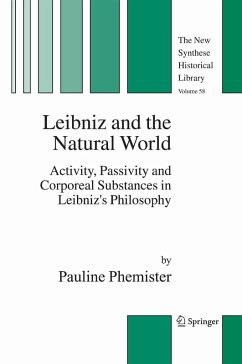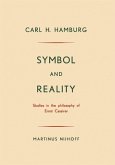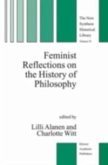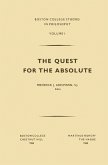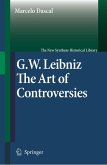In the present book, Pauline Phemister argues against traditional Anglo-American interpretations of Leibniz as an idealist who conceives ultimate reality as a plurality of mind-like immaterial beings and for whom physical bodies are ultimately unreal and our perceptions of them illusory. Re-reading the texts without the prior assumption of idealism allows the more material aspects of Leibniz's metaphysics to emerge. Leibniz is found to advance a synthesis of idealism and materialism. His ontology posits indivisible, living, animal-like corporeal substances as the real metaphysical constituents of the universe; his epistemology combines sense-experience and reason; and his ethics fuses confused perceptions and insensible appetites with distinct perceptions and rational choice. In the light of his sustained commitment to the reality of bodies, Phemister re-examines his dynamics, the doctrine of pre-established harmony and his views on freedom. The image of Leibniz as a rationalist philosopher who values activity and reason over passivity and sense-experience is replaced by the one of a philosopher who recognises that, in the created world, there can only be activity if there is also passivity; minds, souls and forms if there is also matter; good if there is evil; perfection if there is imperfection.
Dieser Download kann aus rechtlichen Gründen nur mit Rechnungsadresse in A, B, BG, CY, CZ, D, DK, EW, E, FIN, F, GR, HR, H, IRL, I, LT, L, LR, M, NL, PL, P, R, S, SLO, SK ausgeliefert werden.
"[Leibniz and the Natural World] lives up admirably to its ambitious aims. [...] in arguing for her main thesis, Phemister also provides an original and fascinating approach to two formidable challenges in Leibniz's scholarship. [...] There is much more to be found in this rich book, which any serious student of Leibniz's metaphysics should study." (Ohad Nachtomy, Bar-Ilan University, Israel, in British Journal for the History of Philosophy 16:1, 2008)
"[...] Phemister's book is a defiant attempt to free Leibniz from the fetters of this misinterpretation, and her eloquent arguments will do much to turn the tide in favour of a more balanced assessment of his natural philosophy." (Richard Arthur, McMaster University, Ontario, Canada, in The Philosophical Quarterly 57:226, 2007)
"Phemister's book is a clear and insightful study [...], and deserves the attention of everyone who wishes to appreciate Leibniz in all his depth and range." (Justin E.H. Smith, Concordia University, Canada, in The Leibniz Review Vol. 16, 2006)
"[...] Phemister's book is a defiant attempt to free Leibniz from the fetters of this misinterpretation, and her eloquent arguments will do much to turn the tide in favour of a more balanced assessment of his natural philosophy." (Richard Arthur, McMaster University, Ontario, Canada, in The Philosophical Quarterly 57:226, 2007)
"Phemister's book is a clear and insightful study [...], and deserves the attention of everyone who wishes to appreciate Leibniz in all his depth and range." (Justin E.H. Smith, Concordia University, Canada, in The Leibniz Review Vol. 16, 2006)
"[Leibniz and the Natural World] lives up admirably to its ambitious aims. [...] in arguing for her main thesis, Phemister also provides an original and fascinating approach to two formidable challenges in Leibniz's scholarship. [...] There is much more to be found in this rich book, which any serious student of Leibniz's metaphysics should study." Ohad Nachtomy, Bar-Ilan University, Israel, in British Journal for the History of Philosophy 16:1, 2008 "[...] Phemister's book is a defiant attempt to free Leibniz from the fetters of this misinterpretation, and her eloquent arguments will do much to turn the tide in favour of a more balanced assessment of his natural philosophy."Richard Arthur, McMaster University, Ontario, Canada, in The Philosophical Quarterly 57:226, 2007 "Phemister's book is a clear and insightful study [...], and deserves the attention of everyone who wishes to appreciate Leibniz in all his depth and range."Justin E.H. Smith, Concordia University, Canada, in The Leibniz Review Vol. 16, 2006

